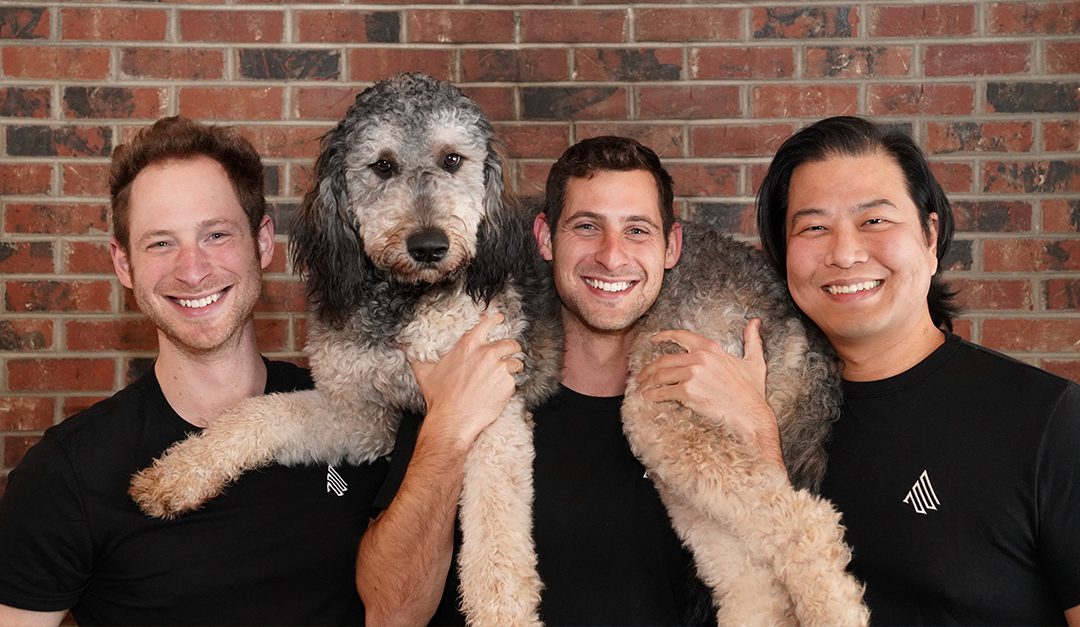By Stacey McLachlan. Photo courtesy of Accord. Originally published in the Summer 2021 issue of Business Class Magazine.
When you know, you know. And what brothers Ross and Ryan Rich (BCom ’14 and ’15, respectively) knew in late 2019, was that it was time to take the leap into a business of their very own.
They’d spent years scheming and dreaming about an intuitive, streamlined sales platform for the B2B market—one that they would’ve loved to have had at their own sales jobs at Google and Stripe—and knew they needed to strike out on their own to really put the idea to the test. They knew their experience planning and marketing events to students during their UVic days would serve them well in this new hustle; they knew they had a solid business education from Gustavson to fall back on; they knew they had each other’s backs, and a talented programmer in Wayne Pan lined up to make their vision a reality.
But there was one important thing they didn’t know: that a pandemic was about to take the world by storm, just months after they had handed in their resignations and launched Accord.
Starting an entrepreneurial venture is a scary, uncertain experience in its own right. (“We took a leap before having funding or anything figured out. It was a plunge without a safety net,” says Ryan.) To do so as the economy and social interactions were being turned upside down by COVID-19 would be enough to throw anyone into a doubt spiral. Somehow, though, Accord has emerged on the other side of a strange first year with $6 million in seed funding, a solid product and the confidence to take on year two with even more gusto.
In some ways, the Rich brothers were at an advantage when the pandemic hit. “We were kind of lucky to be at the stage we were at, going through research and development, and our first financing round was super-lucky ideal timing—it was literally weeks before the market stalled out,” says Ross. “It was nice to not have that pressure.”
Ryan and Ross had already been planning a remote-first workplace, to allow for both personal flexibility and to keep things open for hiring: it put them in the perfect position when everything pivoted to a work-from-home format. The circumstances are what allowed them to hire Pan from afar. “We might not have been open to it before that,” says Ryan.
One of the biggest challenges has been selling a sales tool without any face-to-face contact or physical networking opportunities. “Connecting with people in-person builds such a deeper relationship, and gets them to buy into the vision as well as the value,” says Ross. “Losing those moments was tough.”
Yet, ever the optimists, Ross and Ryan see a positive side to that networking struggle: it pushed the team to double down on the clarity and conviction of their web presence and marketing, and to get more structured with their meetings.
“Sometimes your greatest strengths are your greatest weaknesses,” says Ross.
This philosophy is best exemplified by the product itself—a tool conceptualized by two people who had never built software or done any computer engineering. They may have lacked engineering know-how, but they made up for it with an obsession with the customer.
“Not having a technical background was a positive in a lot of ways,” says Ryan. “Instead of having this urge to build prototypes with code, we relied on interviews with potential users and used those data points to draw things out and prototype using graphics. It allowed us to move a lot faster.”
And more confidently, adds Ross. “It’s almost like we couldn’t go down the wrong path because we’d spent so much time talking with customers about what they needed before we actually made anything.”
In fact, the brothers had only a hand-drawn sketch as they applied to Y Combinator (a US technology accelerator that birthed companies like Stripe, Dropbox, and AirBnB). It may not have been flashy, but the idea of a platform for looping B2B salespeople and buyers into a streamlined decision-making process was impressive enough to get them into the incubator in the first place. When Pan came on board to help build the product, Accord had a strong, user-validated vision—likely why they were able to hit the ground running, despite the pandemic.
The world is slowly shifting back to some semblance of normalcy. But whatever comes their way next, the Accord team can count on a solid product, an enduring passion for the customer and, of course, each other.
“To be honest, I don’t know if I could’ve done it without Ross. We both kept telling each other we weren’t crazy,” says Ryan. “I have a lot of respect for founders who do it on their own…but I couldn’t.”


